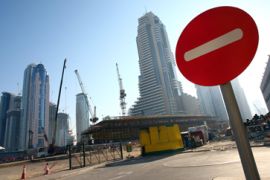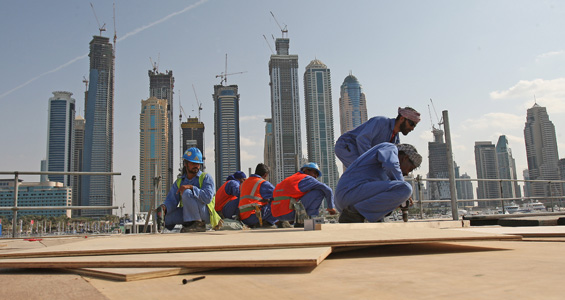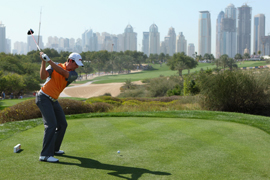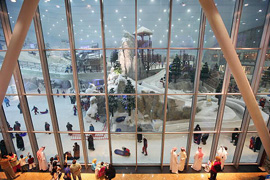Dubai: The political model
Does the emirate’s crisis indicate a lack of economic co-ordination between Arabs?

 |
| Dubai employed mostly Asian migrant workers in its development and construction projects [EPA] |
The emirate of Dubai has in the past few decades been more than a shiny example of glitzy capitalism and the insulation from the repercussions (and responsibilities) of the Arab-Israeli conflict.
It has represented the type of political model which has been promoted to the Arabs, by their rulers and by the West.
When George W Bush, the former US president, visited the United Arab Emirates during his last year in office, he praised Dubai and its models of economic and political prosperity; he promoted the UAE’s mantra and ethos as glimmers of hope to the new generation of Arabs.
It took the former president little more than a few hours during his stop-over to assess the conditions in the region, and to reach his conclusions: resistance to Israel clashes with the type of prosperity that was prevalent in Dubai.
Antithesis of Palestine?
| in depth | |||||||||||||
|
Dubai hit a dramatic rise in the 1990s and became a success story that was carefully calibrated, promoted and disseminated in the Arab media and collective psyche.
Daniel Pipes, who has a reputation for hostility towards Arabs and Muslims, was interviewed two years ago in the Jerusalem Post praising Sheikh Mohammed bin Rashid Al Maktoum, the ruler of Dubai, after the release of his memoirs.
There was not one word about Palestine in that book which nevertheless offered a recipe of unregulated and unrestricted capitalism.
Dubai was supposed to be the antithesis of Palestine. It was designed to create a concrete Utopia that would encourage all young Arabs to forget about their political aspirations and dreams.
In Lebanon, the March 14 opposition movement has been posing this question to the Lebanese people for three years: Hanoi or Dubai? But Hanoi is today a far more promising model than Dubai.
Not only has Hanoi been liberated from foreign occupation and a corrupt puppet regime, but it has also become part of a sovereign country with a record of fast economic growth.
Much has been written about Dubai and even more will be written about the emirate which was positioned as the success story that all Arabs were to emulate.
However, its success is not based on sound economic or classical political theories. It was in fact a projection of what the West wanted to see in the Middle East.
This projection represented the fruits of US co-operation with Middle Eastern governments, especially in the realm of defence and national security. Dubai was more important for the US due to military intelligence co-operation than for its lavish seven-star hotels.
Playground for the rich
 |
| Dubai’s wealth has attracted high-profile sporting events in recent years |
Dubai was supposed to be a vision but one not rooted in the productive sectors of the economy.
There were early warnings of the debacle that struck Dubai World – too much glitz and ostentation and little attention to a careful building of culture and economy that reflect the region.
There was a rush to build multi-billion dollar artificial ski slopes and playgrounds for the very rich of the world.
But Dubai did not want to be part of the region, politically speaking. Instead it modelled itself as a copy of Las Vegas in the heart of the Arab Middle East.
Dubai carefully steered away from all the issues that alarmed and agitated Arab public opinion.
Instead, Dubai and the other six emirates which comprise the UAE made sure that they operated within the realm of US foreign policy priorities. Dubai became a regular stop on the travel routes of US diplomats.
But people will wonder whether the recent crisis in Dubai is the apparent economic mismanagement resulting from rapid urbanisation and modernisation that lacked a soul.
Was this an example of a fundamental contradiction between economic growth and lack of democracy?
China and Vietnam have proved that rapid economic growth without democratisation could work, and work splendidly. Yet, Dubai’s model of economic growth seemed less planned and less guided by a realistic vision of the future.
There was little attempt to match future planning with Dubai’s demographic realities or even of the area around it. Instead, the emirate had to rely on the import of large numbers of Asian workers without any effort to integrate them, or even to afford them decent living standards and human conditions.
Lack of co-ordination
 |
| Many questioned the cost-effectiveness of a ski resort in the middle of the desert [GETTY] |
Dubai has dominated the imagination of young Arabs for less than two decades. Its rise was rapid and its decline may also be rapid as recent press stories seem to indicate.
Dubai’s shortcomings may indicate the lack of economic integration between Arabs. Worse, the UAE’s constituent emirates made no effort to co-ordinate economic planning among them.
In reality, the seven emirates acted like independent sovereign states, up until the recent crisis when Dubai had to plead with Abu Dhabi, the capital, in the name of Arab brotherhood.
It is not clear whether Abu Dhabi will bail its neighbour out, but the capital seems glad to be playing the role of the partial rescuer.
Lessons have to be taught. The relationships between the different emirates, and even between the different Arab countries, will have to be rethought.
Dubai was supposed to be the model of non-politics, or the model of anti-politics. Dubai TV, for example, reflected that message in Arab political and popular cultures. Paris Hilton replaced all the symbols of the Palestinian revolution in the Dubai TV culture. Fun, not resistance, was the new catchword.
Educated and skilled Arabs were welcomed in the Utopian emirate provided they left their political dreams and passions behind them. There was no room for the slogans of the Arab nationalist era, nor for the demands of the democracy or feminist movements.
Dubai would welcome you provided you did what you were told and provided you paid homage to the ruling family.
Arabs questioning policies
But the collapse of Dubai may redraw the political and economic pictures of the region. Maybe governments will now be pressed to explain the purposes and motives behind their economic policies. And maybe the Arab public will now raise more questions about the various models that are promoted as exemplary by the West.
It was only a few years ago that Western governments and media believed the emirate of Dubai could do no wrong. Western publications that had once praised the Dubai experiment and the wisdom and vision of “Sheikh Mo” are now discovering the shortsightedness of the policies that guided the emirate’s growth. Western media are suddenly discovering the plight of Asian workers in the region.
The Arab public has experienced disappointments and disillusionments before but this one will have consequences for US foreign policy.
The Arab people have been urged to abandon struggle and the search for justice and to seek the model of Dubai. Now, the young generation of Arabs will not seek pilgrimage in Dubai.
Another destination will be sought and this could signal a return to Palestine.
As’ad AbuKhalil is a professor of political science at California State University, Stanislaus, and author of the Angry Arab blog.
Al Jazeera is not responsible for the content of external websites.
The views expressed in this article are the author’s own and do not necessarily reflect Al Jazeera’s editorial policy.
